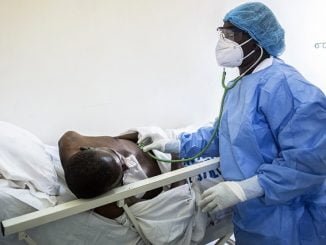
Kampala, Uganda | URN | Uganda will not discontinue the use of the AstraZeneca jab in immunizing people against COVID-19 with the raising fears of blood clots and low platelet counts as side effects of the drug, experts have said.
The experts said in a briefing on Thursday 8, April 2021 that the AstraZeneca drug that they have so far used to vaccinate 144,025 people in Uganda is safe.
Dr Yonas Tegnen Woldermariam, the World Health Organization (WHO) Uganda Representative said though the European Medicines Agency (EMA) has just recommended that blood clots and low blood platelet count be listed among the Jab’s possible side effects, they have found the same effects more common in people who suffer severe COVID-19.
He told this publication that the WHO strategic advisory group on immunization has reviewed data from EMA and other UK regulators and concluded that vaccination is worth continuing even with the shortcomings considering that more than a 200 million people across the globe have already benefited.
In Uganda, Dr Alfred Driwale who heads the Uganda National Expanded Programme on Immunization (UNEPI) says the commonest side effects they have come across are of a fever and headaches that resolve with simple pain medication such as Panadol.

He says these side effects are not comparable with the benefits they are looking for in the AstraZeneca jab which are to prevent severe disease, expensive medical intervention and death. Dr Driwale said earlier on two weeks after the exercise had been launched, that they received a number of people reporting to hospital after suffering some serious effects which led to hospitalization but have also been documented in the clinical trial.
Read Also: Delivery of Uganda’s second dose of AstraZeneca COVID-19 vaccines could delay
Experts say while adverse effects of a drug being monitored wouldn’t be a cause for alarm, they have suffered a challenge of the side effect information being unnecessary being blown out of proportion on social media platforms.
As a result of this, Health Minister Dr Jane Ruth Aceng says they are engaging in a communication campaign to debunk misinformation. She for instance mentions that the public has been misled into believing that there is a link between vaccination and alcohol consumption.
“There is no scientific evidence to show that when you are vaccinated you should stay away from alcohol for 40 days. There is no absolute contraindication to alcohol if taken in moderation.”



